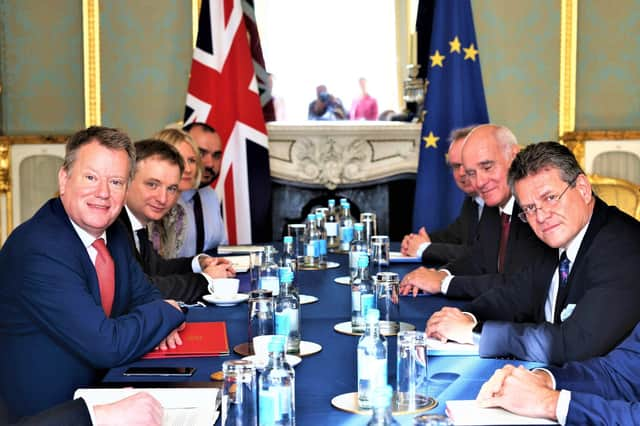The ‘gradualism’ of the Northern Ireland Protocol fits the Irish republican strategy


However one concept articulated by the Fabian Sydney Webb has remained in my mind ever since — “the inevitability of gradualism”.
This underlies much of republican strategy both then and throughout the intervening years.
Advertisement
Hide AdAdvertisement
Hide AdThe Northern Ireland Protocol represents the culmination of a campaign by the Irish government and the EU to progressively detach Northern Ireland from the rest of the United Kingdom, first economically and ultimately politically.


Recent proposals emanating from the EU to mitigate the protocol’s manifest impact on business wholly fail to address the core problem that it has created. Reduction in the number of checks and restrictions on domestic trade merely mitigate the toxicity of the mechanism, which remains lethal in its long-term outcome. Unfettered internal trade is an essential feature of any nation.
All externally imposed restrictions are inconsistent with the concept of nationhood.
This essential right to unfettered trade was guaranteed by Article 6 of the Act of Union 1800. A high court judge recently decided — though this decision is under appeal — that this article was implicitly repealed by the EU Withdrawal Act 2020 and associated legislation, notwithstanding Boris Johnson’s assurance in the House of Commons that the Act of Union remained unchanged.
Advertisement
Hide AdAdvertisement
Hide AdThe protocol rides roughshod over the ‘Good Friday Agreement’, which provides that there will be no change in Northern Ireland’s constitutional position without the consent of its people.
The EU cynically maintains that it prohibits any restrictions along the land border with the Republic. Nowhere does the agreement text support such suggestion.
The EU are of course entitled to hold concerns about their internal single market. But no less so is the United Kingdom. Should EU concerns be not just a pretext for trouble making, these could be addressed by creating a border down the middle of the Celtic Sea between Ireland and France.
Currently the EU devotes much funding to the development of economic activity between Northern Ireland and Ireland. Conspicuously no effort has been devoted by any party to protecting, let alone enhancing, domestic economic activity with the mainland.
Advertisement
Hide AdAdvertisement
Hide AdThe impact of the protocol on the Northern Ireland economy is obvious. The province’s trade with the rest of the UK is worth approximately twice that of its trade with the entire EU.
The negative impact of the protocol on GDP has recently been estimated to be in the region of £850million per annum. A sum that the province can ill afford to lose.
Lord Frost’s current negotiations are going nowhere fast! The EU notoriously only negotiate as the midnight hour fast approaches.
A ‘drop dead date’ needs to be publicly stated by Lord Frost, in default of which unionist ministers in the Stormont Executive must create one by stating that they will withdraw from the executive if the protocol issues are not resolved within a stated period!
Advertisement
Hide AdAdvertisement
Hide AdOnly then will we learn whether Boris Johnson actually intends to deliver Brexit for the whole UK.
Some have disingenuously sought to justify the protocol on the basis that withdrawal from the EU was ‘against the will’ of the electorate.
The fatal flaw in this argument is that whilst the majority of local electors did vote to remain, there is no evidence to suggest that they did not consent to being bound by a majority vote in the country as a whole. Such consent is assumed in each democratic election.
The existence of the protocol in any form is anathema to any unionist.
Advertisement
Hide AdAdvertisement
Hide AdThis renders further consideration of a role for the European Court of Justice (ECJ) more than somewhat superfluous. Nevertheless it remains useful to rehearse that the ECJ has a fundamental conflict of interest should it retain any role in adjudicating disputes between the EU and the UK.
In any dispute the arbiter must not only be free of any conflicting interest but also be free of the appearance of such conflict.
For unionist leaders there can be no room for compromise in rejection of the protocol. Too much has already been given up relying on the belief that there could be no change in the constitutional position without consent. That ‘trade-off’ is nullified so long as the protocol remains in existence.
Until the government successfully frees the province from shackles of the protocol and, if necessary, re-enacts Article 6 of The Act of Union, the Good Friday institutions remain devoid of any substratum.
Advertisement
Hide AdAdvertisement
Hide AdJulius Caesar had to take a difficult decision with irreversible consequences in 49BC when deciding to cross the Rubicon, so too may unionists. If the protocol remains participating further in the NI Executive is to sup a potion which ultimately will prove fatal.
It is said that a frog dropped in boiling water will frantically endeavour to get out. But placed gently in tepid water and the heat turned low it will float quite placidly, as it sinks into a tranquil stupor like a human in a hot bath. Ultimately without resistance the frog allows itself to be boiled to death.
The apocryphal story demonstrates the challenge for unionist leadership to ensure that the protocol is annulled – without further procrastination. Failure to do so condemns the province to an ongoing process of the inevitability of gradualism.
• Jeremy Burchill was an Ulster Unionist Assembly Member 1982-86 for East Belfast and a member of the 1975 Constitutional Convention. He now lives in England
Advertisement
Hide AdAdvertisement
Hide Ad• Other comment pieces below, and beneath that information on how to subscribe to the News Letter
• Ruth Dudley Edwards Dec 7: Outward looking Ulster Unionist Party presents its vision to US
• Edgar Graham’s sister Dec 7: With no prospect of justice I fight to protect his legacy
• Owen Polley Dec 6: The volume of propaganda in favour of the NI Protocol is increasing
Advertisement
Hide AdAdvertisement
Hide Ad• Henry McDonald Dec 4: The once puritan DUP now stands up for publicans
• John Wilson Foster Dec 4: London is a cultural capital for the Irish
• Ben Lowry Dec 4: It is a great pity to see York St road plan in Belfast slipping away
• Canon Ian Ellis Dec 3: Church leaders call for an end to the violence in Colombia
Advertisement
Hide AdAdvertisement
Hide Ad• Dr Paul Kingsley Dec 2: Magee has courses not on offer elsewhere yet Protestants are under-represented
——— ———
A message from the Editor:
Thank you for reading this story on our website. While I have your attention, I also have an important request to make of you.
With the coronavirus lockdowns having had a major impact on many of our advertisers — and consequently the revenue we receive — we are more reliant than ever on you taking out a digital subscription.
Subscribe to newsletter.co.uk and enjoy unlimited access to the best Northern Ireland and UK news and information online and on our app. With a digital subscription, you can read more than 5 articles, see fewer ads, enjoy faster load times, and get access to exclusive newsletters and content.
Visit
now to sign up.
Advertisement
Hide AdAdvertisement
Hide AdOur journalism costs money and we rely on advertising, print and digital revenues to help to support them. By supporting us, we are able to support you in providing trusted, fact-checked content for this website.
Ben Lowry, Editor